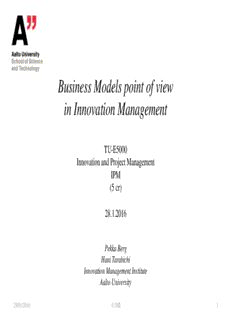
The St Gallen Business Model Navigator PDF
Preview The St Gallen Business Model Navigator
Business Models point of view in Innovation Management TU-E5000 Innovation and Project Management IPM (5 cr) 28.1.2016 Pekka Berg Hani Tarabichi Innovation Management Institute Aalto University 29/01/2016 © IMI 1 TOPICS OF THE DAY 9.00 Start of the Day – Learnings from your Homework – Lecture 1: Shafer´s Business Models – Analysis of the pre-readings in the teams – Outcome of the team discussions – Lecture 2: Gassmann´s Business Models – Analysis of the pre-readings in the teams – Outcome of the team discussions 12.00 Lunch – Lecture 3: LEGO Serious Play with Agents and Hats – Intro for the Homework – Working for the IDBM industrial project dealing with the topic today 15.30 Wrap-Up of the day 16.00 End of the Day © IMI 2 PreReadings 1. Shafer et.al., 2005, The power of business models, Business Horizons 48, 199-207. 2. O Gassmann, K Frankenberger, M Csik – 2013, The St. Gallen Business Model Navigator, Working paper, bmi-lab.ch © IMI 3 Readings (Voluntary) 1. Sundbo, J., 1997. Management of Innovation in Services. 2. Edvardsson, B. et.al. 2012. Customer integration within service development—A review of methods and an analysis of insitu and exsitu contributions. Technovation 32 (2012) 419–429. 3. Osterwalder, A. & Pigneur, Y. 2005. Clarifying Business Models: Origins, Present, and Future of the Concept. 4. Chesbrough, 2007, Business model innovation: it’s not just about technology anymore, Strategy & leadership , vol. 35 no. 6 2007, pp. 12-17, Q Emerald Group Publishing Limited, ISSN 1087-8572 5. Amit, Zott, 2012, Creating Value Through Business Model Innovation, MIT Sloan Management Review. 6. Mabogunje, A., Kyvsgaard Hansen, P., Berg, P. 2013. Exploring Innovation – A Language Approach. CO-CREATE Conference, Espoo, 16-19 June 2013. 7. Snowden et.al., 2007, A Leader´s Framework for Decision Making, Harward Business Review, November 2007 © IMI 4 Homework 3 for 2.2.2016: Business Model 1. Describe the (d)evolution (=innovation process) of your corporate case business model based on this day learnings – Your model in the starting point today • What is the value proposition of your model? • How do you create value in your model? • How do you capture value in your model? – Development of your model • Use the Shafer´s “components of business model affinity diagram” • Use the Gassmann´s three-step “imitation and re-combination”-method and consider if some elements or ideas of the described 55 business models could be useful in your case. – Extra • How does your Business Model reflect the strategic choices and their operating implications of your Case company? • Think also the change of the business model in next, 3? – 5? – 10 years? 2. Visualize this journey by Legos-paper-mockup prototype(s). – Create also agents and connect them if relevant – Take photos and videos – Be ready to present the status of your work in the wrap-up of the day 29/01/2016 © IMI 5 Contents 1. Business Model approach 1. Introduction 2. Business Model by Shafer 3. Business Model by Gassmann 2. Teamwork 3. Homework 29/01/2016 © IMI 6 Goal To consider business models and innovation offering in order to create shared understanding for future work. 29/01/2016 © IMI 7 Why Gassmann? Process vs. Offering vs. Business Model Before the innovation process can be discussed, there must be an understanding of the desired offering(s) and business model(s) . 29/01/2016 © IMI 9 “Before discussing how to innovate a business model, it is important to understand what it is that is to be innovated.” Gassmann, 2013
Description: